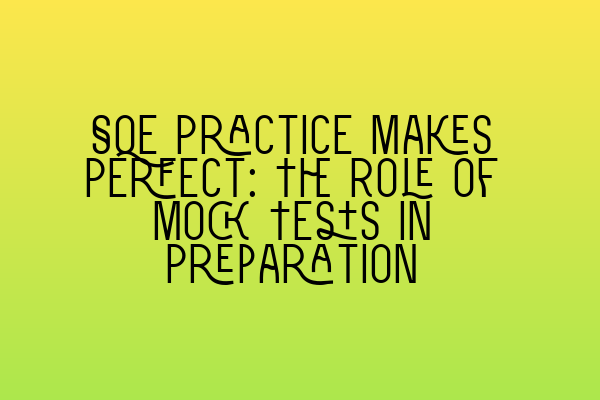SQE Practice Makes Perfect: The Role of Mock Tests in Preparation
In the world of legal education and professional development, the Solicitors Qualifying Exam (SQE) has become a significant milestone for aspiring solicitors. This rigorous examination assesses the knowledge and skills required for the practice of law in England and Wales. And as with any major exam, preparation is key.
While traditional study methods, such as textbooks and lectures, are crucial in understanding the theoretical aspects of the law, they may fall short in preparing aspiring solicitors for the practical application of legal principles. This is where mock tests prove to be invaluable.
The Power of Mock Tests
Mock tests replicate the format and content of the actual SQE, allowing candidates to experience the exam environment and gain insight into their strengths and weaknesses. By engaging in mock tests, aspiring solicitors can:
- Improve Time Management: Mock tests simulate the time constraints of the actual exam, enabling candidates to practice allocating their time effectively. This is particularly important given the SQE’s time-sensitive nature.
- Identify Knowledge Gaps: Mock tests highlight areas of weakness and help candidates identify gaps in their knowledge. This allows for targeted studying and revision to ensure a comprehensive understanding of all examinable topics.
- Enhance Exam Technique: The SQE requires not only substantive legal knowledge but also the ability to apply that knowledge to practical scenarios. Mock tests provide opportunities to practice applying legal principles to hypothetical situations, improving exam technique and critical thinking skills.
- Build Confidence: Sitting for a high-stakes exam can be nerve-wracking. Mock tests help candidates familiarize themselves with the exam format and reduce test anxiety. Increased confidence can positively impact performance on the actual exam day.
It is important to note that mock tests should be approached as learning experiences rather than simply a means to assess one’s knowledge. By reviewing the answers and explanations provided after each mock test, candidates can gain a deeper understanding of the applicable legal principles and improve their future performance.
The Role of Mock Tests in SQE Training
Integrating mock tests into your SQE training plan is essential for a comprehensive and effective preparation strategy. These tests provide the opportunity to bridge the gap between theory and practice, ensuring that candidates are well-equipped to handle the complex demands of the SQE.
Mock tests can be accessed through various SQE preparation providers and online platforms. They are often available in both multiple-choice and written question formats to mimic the variety of question types encountered in the actual exam.
As a solicitor preparing for the SQE, it is recommended to familiarize yourself with the structure and requirements of the exam before attempting mock tests. This will allow you to focus your preparation efforts and make the most of the practice opportunities provided.
Complementing Mock Tests with Other Study Resources
While mock tests are an invaluable component of SQE preparation, they should be used in conjunction with other study resources. Textbooks, lectures, and practical workshops can provide the necessary foundational knowledge that forms the basis of successful performance on mock tests and the actual exam.
For example, if you are seeking a deeper understanding of tenant rights in the UK, the article “Tenant Rights in the UK: Understanding Your Legal Protections” explores this topic in detail.
If you want to delve into the intricacies of land law, the article “Examining the Intricacies of Land Law in the UK” offers essential insights.
For a comprehensive understanding of legal considerations in residential leases, the article “Legal Considerations in Residential Leases: Essential Insights for Solicitors” is a valuable resource.
If you are interested in interactive learning experiences, workshops on land law can enhance your knowledge and exam preparation. Please check out the article “Workshops on Land Law: Interactive Learning for Aspiring Property Law Professionals” for more information.
Finally, if you want to unravel the legal framework for tenants in lease laws, the article “Lease Laws in the UK: Unraveling the Legal Framework for Tenants” provides essential insights.
Conclusion
In summary, the SQE is a demanding examination that requires both theoretical knowledge and practical application. Mock tests play a vital role in preparing aspiring solicitors for the challenges they will face on exam day. By improving time management, identifying knowledge gaps, enhancing exam technique, and building confidence, mock tests significantly contribute to a comprehensive SQE preparation strategy.
Remember to complement your mock test practice with other study resources to ensure a well-rounded understanding of the law. Utilize textbooks, lectures, and workshops, and explore the related articles provided to deepen your knowledge on specific topics relevant to the SQE.
Embrace the power of practice, leverage the benefits of mock tests, and optimize your chances of success in the Solicitors Qualifying Exam.

Leave a Reply